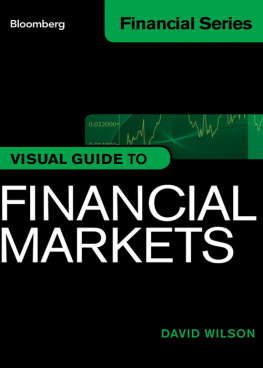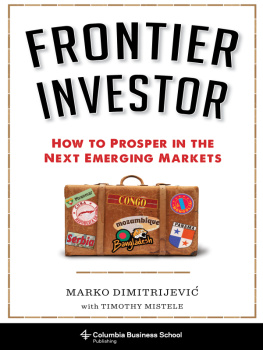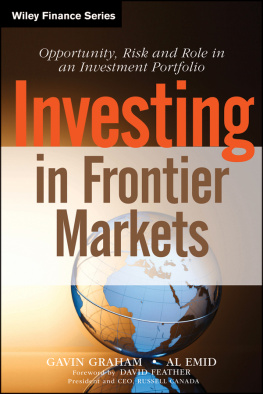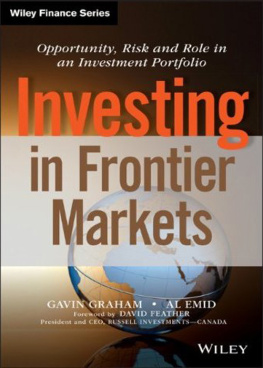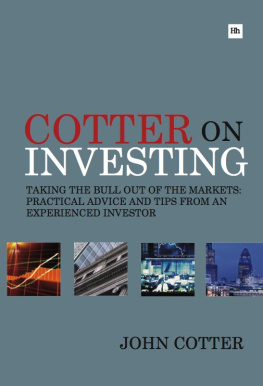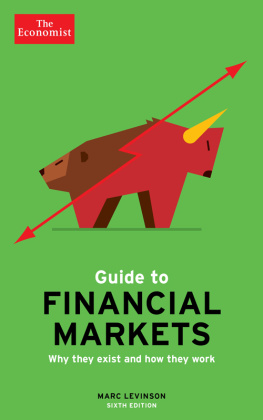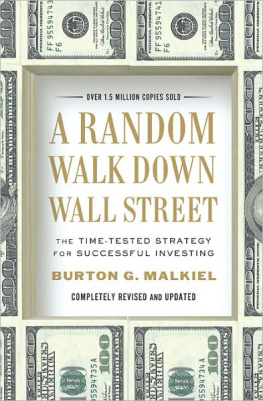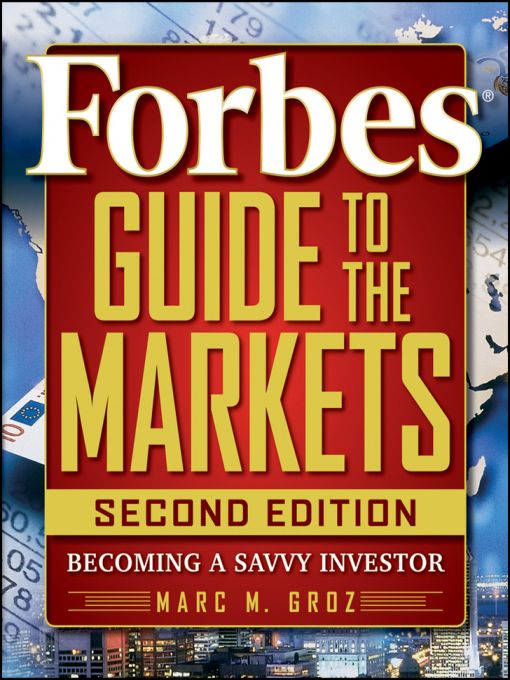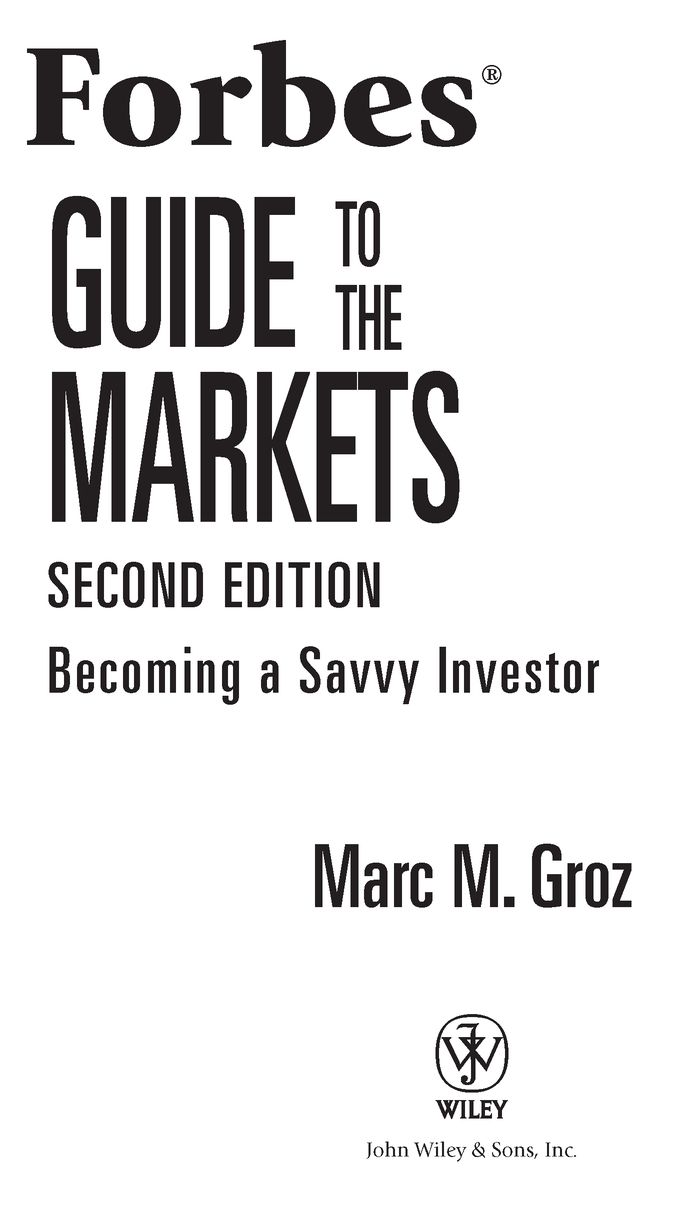Table of Contents
Acknowledgments
Many people helped in the creation of this new edition. First of all, I would like to thank my editors at Forbes (Vahan Janjigian and Barbara Strauch) and Wiley (Laura Walsh) for all their help and encouragement. I would also like to thank Anastasia Skoybedo and Chris Reich, my research interns at Topos, for their indefatigable fact-checking and service as Emperors Wardrobe Consultants extraordinaire.
In the 10 years that have elapsed since the first edition of this book was published, many investment and other professionals have generously shared their knowledge, helping to shape this new edition. Special mention must go to: Ifty Ahmed, Reuven Brenner, Don Brownstein, Sanjeev Daga, Emanuel Derman, Asami Ishimaru, Tom Kyle, Jon Lukomnik, David McClean, Bill Overgard, Richard Rosenfeld, Jason Ruspini, Neil Strumingher, Michael Trenk, Jan van Eck, and Walt Weissman.
Extra special thanks goes to my wife, Robbin Juris, whose companionship is beyond measure. This book is dedicated first of all to her; it is also dedicated to my parents, who instilled in me a lifelong love of reading and writing; and, last but not least, it is dedicated to my boys: Gabriel, who was an infant during the writing of the first edition and is rapidly becoming an amazing young man; and Zachary, born three days after the attacks of September 11, 2001, an amazing kid without whom I might not be here at all.
Note to the Reader
The world of financial markets has its own special language. To help familiarize you with this language, we will highlight key financial market words and phrases in bold type, as they are discussed. Many of these terms are defined in the text, or in brief side bar definitions along the side of the page. For ease of reference, or to refresh your memory about what something means, the glossary at the end of the book contains all of the definitions provided in the text.
About the Author
Marc Groz is a leading authority on financial markets. He has developed investment strategies for two top-ranked investment funds and served as chief risk officer for two multi-billion dollar hedge funds. He is managing member of Topos, an asset manager and risk advisory firm.
Marcs views on the markets have been quoted by The Financial Times, The Wall Street Journal, Barrons, Risk, Reuters, TheStreet.com, MarketWatch. com, Forbes.com, Business Week, and The New York Times. He has appeared on CNBC, Fox Business News, Bloomberg (radio and TV), and BBC-TV Worldwide.
He has lectured widely to diverse audiences, ranging from his students at New York University to members of the International Association of Financial Engineers. He has moderated panel discussions on financial innovation with Yale University professor Robert Shiller and regulatory reform with Connecticut Attorney General Richard Blumenthal.
Marcs interest in how things really work spans decades. After achieving Honors in the Westinghouse (Intel) Science Talent Search, Marc was accepted at the age of sixteen by Harvard, M.I.T., and Columbia. He attended Columbia University as a John Jay National Scholar, graduating with honors in 1979 (Math/Psych). He did graduate work in mathematics, studying with the world-renowned algebraist Samuel Eilenberg. He was recipient of the W.W. Cumming Prize in Psychology.
Marc is the owner/inventor of patented and patent-pending financial instruments, gaming systems, valuation methods, and mechanisms for protecting privacy in the digital age. He is married and has two sons.
Introduction: Becoming a Savvy Investor
The times are changed, and we change with them.
Roman proverb
What a difference a decade makes! Ten years ago, when the first edition of ForbesGuide to the Markets was published, the global economy was booming. Dot com was the watchword of the dayeverybody wanted to work for one. Dow 36000 was supposed to be just around the corner.
Today, the global economy is suffering. Bad news is everywhere. Everybody just wants to keep their job. Were closer to Dow 3600 than Dow 36000. Some argue that economic conditions are akin to the Great Depression of the 1930s. Others see the buying opportunity of a lifetime, arguing that the prices of assets have fallen far below their true value. A third group sees some great opportunities amidst the carnage, but expects years to pass before the markets get back to normal.
How does one go about investing in times like these? Will things ever get back to normal? What is normal, anyway?
This question calls for some serious detective work, as practiced by a seriousif fictionaldetective: Sam Spade. In The Maltese Falcon, Spade confronts the case of a man who disappeared apparently without any cause: a man named Flitcraft. It turns out that Flitcraft who, by all accounts had a great life, had simply disappeared: He went like that, Spade said, like a fist when you open your hand.
Spade first learns of the case five years after the disappearance; it turns out that Flitcraft had been walking to lunch and passed a construction site that had just the skeleton of an office building. A beam or something fell eight or ten stories down and smacked the sidewalk alongside him... a piece of sidewalk was chipped off and flew up and hit his cheek... he still had the scar when I saw him....
Spade continues, He was more shocked than frightened. He felt like somebody had taken the lid off life and let him look at the works. This, it turns out, accounts for Flitcrafts sudden disappearance. Though he had been a good citizen and a good husband and father, he knew now that men lived only while blind chance spared them.
I will come back to Spades story in a moment, but first we need to take a detour and talk about a close relative to blind chance, the concept of risk (a subject that deserves and has its own chapter). The financial crisis has brought the concept of risk to the center of investors collective awareness. In happier times, people focus on the expected return on their investments. Today, as Will Rogers once said, Im not so much concerned with the return on capital as I am with the return of capital.
As a former chief risk officer of two multi-billion dollar hedge funds, I have thought a great deal about risk. From my perspective, it is important to recognize that risk changes over time, along with peoples perspective about it. From this standpoint, there was plenty of risk around in the late 90s, but it appeared in a different formrisk of losing ground against ones peers, of not keeping up with the Joneses. Later, after the Internet bubble burst, the fear of losing what one had came to dominate the fear of not getting more.
Still later, as the housing bubble inflated in this decade, a new fear of missing out (and desire to profit) came to dominate. By early 2009, however, the collective risk profile of investors had transformed yet again, with ready cash valued as highly as dot com stock options were a decade earlier.
As we can see, a societys ideas of normal or expected evolves over time. Ten years ago, at the end of a long secular bull market, most Americans were too young to remember the Great Depression of the 1930s. Many had grown up or were born after the stagflation of the 1970s. It was all too easy for the hard-earned lessons of those times to be written off as ancient history. From the standpoint of 2009, we are led to wonder: What will the world look like in five or ten years? What existing data and theories are relevant to us as investors?


